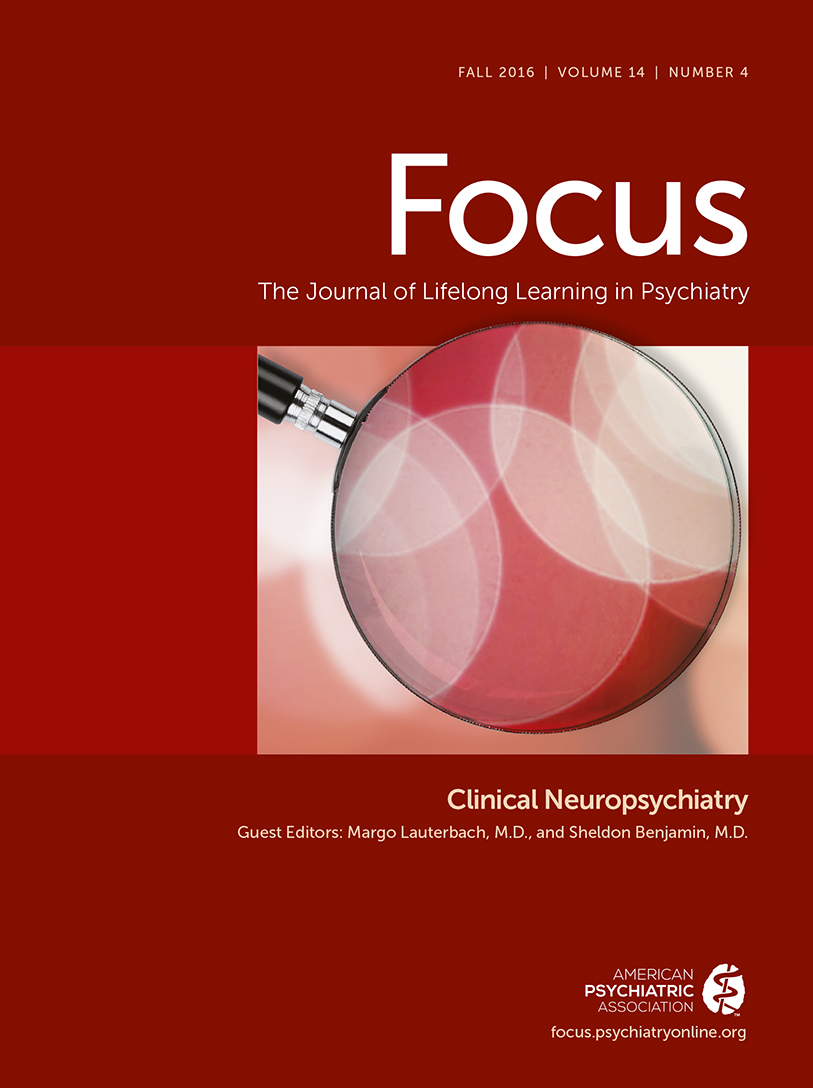Clinical Neuropsychiatry
General psychiatrists are increasingly expected to be able to diagnose common neuropsychiatric disorders. Residents must now achieve milestones in neuropsychiatry and neuroscience as part of general psychiatry training (1). It is therefore altogether fitting that neuropsychiatry has been selected as the topic for this issue of Focus. Reviewed in this issue are common disorders at the interface of psychiatry and neurology, the underlying mechanisms of which are beginning to be elucidated. These conditions often present to psychiatrists, initially or eventually, as behavioral or mood changes, cognitive impairment, or psychosis.
Vassilis Koliatsos, M.D., highlights the many presentations of cognitive impairment and a clinical approach to patients with cognitive complaints (2). He conveys several clinical pearls to guide assessment and treatment of this common problem.
Thomas McAllister, M.D., presents a comprehensive overview of mild traumatic brain injury, from clinical practice to the latest research (3). The neurobehavioral sequelae that can result after mild brain injury are emphasized along with the complexities that influence outcomes.
Autoimmune limbic encephalitis has become well known as a neuropsychiatric condition that can first present to psychiatry because of its association with psychosis and with cognitive syndromes that are responsive to immune system–based treatments. Michael Zandi, Ph.D., M.R.C.P., presents a clinical approach to patients with suspected anti-NMDA receptor encephalitis, specifically with regard to assessment and differential diagnoses (4).
Sepideh Bajestan, M.D., Ph.D., and Curt LaFrance, M.D., M.P.H., outline the biological and psychosocial underpinnings of nonepileptic seizures and present practical clinical approaches to diagnosis and treatment (5). Mood disorders often co-occur with epilepsy. Jay Salpekar, M.D., highlights diagnostic considerations and treatment strategies for these comorbid disorders, with attention to temporal lobe pathophysiology, and offers pharmacological pearls for clinical practice (6).
Peter Ljubenkov, M.D., and Bruce Miller, M.D., provide Focus readers with a clinical guide to behavioral-variant frontotemporal dementia, a disorder that often presents to psychiatrists (7). Differential diagnoses, underlying genetics, and clinical pathological correlates are included.
We are extremely grateful to the authors of this clinical neuropsychiatry edition of Focus and fellow members of the American Neuropsychiatric Association for their kind collaboration. We hope you will enjoy learning from their work and using the information to strengthen your practices.
1 : Neuropsychiatry and neuroscience milestones for general psychiatry trainees. Acad Psychiatry 2014; 38:275–282Crossref, Google Scholar
2 : A clinical approach to cognitive impairment. Focus 2016; 14:437–447Link, Google Scholar
3 : Mild traumatic brain injury. Focus 2016; 14:410–421Link, Google Scholar
4 : Autoimmune encephalitis. Focus 2016; 14:432–436Link, Google Scholar
5 : Clinical approaches to psychogenic nonepileptic seizures. Focus 2016; 14:422–431Link, Google Scholar
6 : Mood disorders in epilepsy. Focus 2016; 14:465–472Link, Google Scholar
7 : A clinical guide to frontotemporal dementias. Focus 2016; 14:448–464Link, Google Scholar



